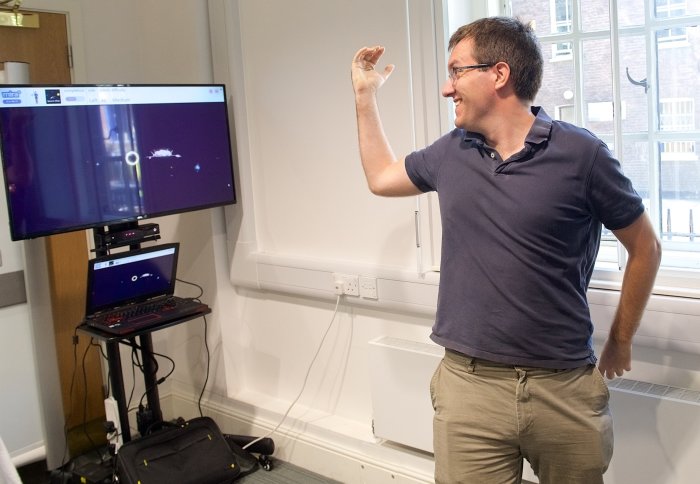Imperial showcases work to improve patients’ experience of NHS services
by Maxine Myers

Virtual exercise games for rehabilitation and a robotic rectum to detect prostate cancer were on display at a special showcase event.
The St Mary’s Patient Experience Hub is an initiative designed to use medical simulation and tools to improve the experience of patients and families at St Mary’s Hospital.
The Hub is led by the Imperial College Centre of Engagement and Simulation Science (ICCESS), co-directed by Professor Roger Kneebone and Dr Fernando Bello. They are working in partnership with Imperial College NHS Healthcare Trust and the project is funded by Imperial Health Charity.
Dr Fernando Bello said: “Providing good patient experience of our NHS services is a vital outcome in the work that we do. It has been shown that good patient experience leads to better clinical results. The Hub aims to be a leader in this field by using our simulation and tools to redesign care pathways, train clinical staff and to improve the delivery of care. I hope guests at our event were inspired by the work that we do and will get involved in our research and engagement activities.”
At the event guests had the opportunity to learn more of a robotic rectum, which could help doctors, and nurses detect prostate and rectal cancer. The technology, which consists of prosthetic buttocks and rectum with in-built robotic technology, has been developed by scientists at the Simulation and Modelling in Medicine and Surgery Research Group (SiMMS) at the College.
The idea is the device helps train doctors and nurses to perform rectal examinations by accurately recreating the feel of a rectum, a muscle that regulate the passage of fluids known as sphincters and the prostate, providing real-time feedback on their examination technique. The device contains small robotic arms that apply pressure to the silicone rectum, to recreate the shape and feel of the back passage.
Guests also had the opportunity to explore and learn more about Exergames - exercising through gaming -for paediatric physiotherapy.
The Mira system uses state-of-the-art movement sensing technology in combination with a set of exercises and bespoke games to enable a more efficient delivery of physiotherapy and rehabilitation services. The games help patients perform the right exercises, gives them incentives to progress and tracks how effectively they are doing them at the clinic or at home. Researchers from SiMMS are working with MIRA Rehab to develop and validate their Exergames in partnership with the Paediatric Physiotherapy Units at St Mary’s and Chelsea & Westminster Hospitals.
First year medical students also presented their work to develop a simulation that looks at how medical students with depression access mental health services.
A study published in the Journal of the American Medical Association JAMA) found that 27 per cent of medical students worldwide suffer from depression.
The simulation will involve re-enacting key points in the medical student’s journey through the healthcare system, such as recognising signs of depression, diagnosis and treatment.
The aim is to raise awareness of the support on offer as well as get feedback from other students on their experiences of accessing services and where to improve.
Ending the event, Dr Fernando Bello outlined the plans for the Hub over the next year. They include further work using simulation to address adolescent mental health, as well as vaginal examinations in pregnant women, and a new strand of work on asthma and wheeze in children.
Article text (excluding photos or graphics) © Imperial College London.
Photos and graphics subject to third party copyright used with permission or © Imperial College London.
Reporter
Maxine Myers
Communications Division